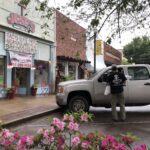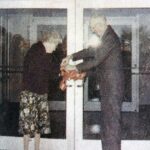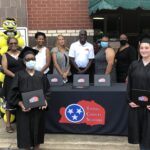

Tonight, as they open a new show, Munford’s theater department is tackling a difficult subject: school shootings.
Those associated with the show want to be clear what the show is and is not.
It’s not about any one shooting and it’s not about the act of shooting students.
It is about the people affected.
A different perspective
“In this world there’s a lot of violence and, with all of this going on, it’s interesting to see it from a student’s perspective rather than what the media is putting out,” said senior Abby Rains, who plans to attend the University of Memphis next year and major in Psychology and minor in Musical Theater. “It’s really interesting because a lot of what you see (after an event) is why the person did it and all the light is shed on the shooting rather than the victims.”
Victoria Galvan-Majors said she cried during the first read-through.
“I got very emotional during it,” the Munford High School sophomore said. “It’s not about really what’s happening, it’s about the people who are involved and who are affected, in the end, and I just think that’s really beautiful.”
They don’t want to give the format of the show away – they don’t want to spoil anything – but they will say facets of the Declaration of Independence are weaved throughout.
Lily Spencer’s character Monica narrates the portion which discusses life, liberty and the pursuit of happiness. You’ll have to attend the play to find out why it’s so symbolic, she said, but through this show the students have really begun to understand what the students from schools where mass shootings have taken place went through.
“(Director Aliza Moran) wanted us to go in depth and not just do surface-level characters,” said sophomore Taniys Webb. “Just seeing what people went through and the effects on their lives it puts me in a new perspective. I didn’t know how traumatic it could be.”
To prepare, they watched a documentary on the Columbine massacre. The April 20, 1999 shooting in Littleton, Colo. happened before any of them was ever born. The iconic scenes of students leaving the high school with their hands on their heads was relatable as they were going through rehearsals.
“I realized this is real,” said Lily. “This is what happened. It’s not far-fetched.”
“I saw people were running out of the school with their hands on top of their heads,” said sophomore Christian Lott. “And I’m just thinking this could happen any day here. It’s just sad to think that you come to school to get an education and you never know when somebody’s gonna walk inside the school with a gun. It’s the scary fact of this.”
Will I come back?
“Declaration” isn’t like most school plays.
It isn’t a feel-good, upbeat musical like “Shrek” or a classic Shakespearean tragedy like “Romeo & Juliet.” It’s a fictional adaptation of real-life events, of the fears today’s generation faces every single day.
It’s set at present-day Munford High School and uses social media to help reiterate the underlying message that events of this nature can happen anywhere.
“In a lot of the scenes you insert your own school name, so at the end of the show they read tweets and it’s like, ‘Shocking tragedy at #munfordhighschool … Did you hear about the #munfordhighschool shooting?’” said Lily. “We’ve seen Parkland and seeing Munford really makes you think it could be real. (After last year’s intruder) you realize it could happen here. We sit in these scenes in the classroom and we’re like, whoa, maybe we just need to quit arguing with each other and be nice because you don’t know what could happen.”
Shootings at American schools have been documented since before the Civil War and mass killings, those in which four or more people have been killed by the assailant(s), are on the rise. According to a 2018 study published by the Journal of Child and Family Studies, more people have died or been injured in mass school shootings in the US since 2000 than in the entire 20th century.
For many of the actors in Munford’s production of “Declaration,” the Feb. 14, 2018 shooting at Marjory Stoneman Douglas High School in Parkland, Fla. was the first one with which they personally identified.
“I saw it (had happened) when I was on the bus and I thought, ‘You know, this morning I did my normal day … and they did the same thing, but I came home and they didn’t,'” Lily said.
Not returning from school is a very real fear for each of the six students interviewed.
“(Sandy Hook) was definitely a shocker to people that nobody is truly safe at their school, whether you’re just in kindergarten or you’re in 12th grade or you’re in college,” said Houston Clark.
Since Parkland, the sophomore and his sister have attended rallies in support of gun control. He said he fears more innocent people dying while trying to learn.
“I think about what if I come to school and I don’t come back? I have a homeschooled friend who is really worried for me because I go to school every day at a public school and anyone can abuse that and try to hurt us.”
Politics aside
There have have been 82 shootings at schools (in which one person was injured or multiple people killed) since Parkland and 227 since Feb. 5, 2010. Since 2008, there have been five shootings involving schools in Memphis, one in Jackson in 2014 and one after a football game in Brownsville in 2018.
The play isn’t about a particular shooting, it isn’t about a shooter and it isn’t meant to be a political debate, said drama teacher April Vincent.
“I had a kid who asked me, ‘Is this an anti-gun play?’ I think there’s one mention of guns, we never see a shooter,” she said. “Nobody in here is saying ‘let’s get rid of guns!’ I want you to be assured of that.”
Through the play some students said their opinions have been changed while others have not.
“I wasn’t big on the gun control thing before because I’m a child,” Victoria said. “My grandparents, they’re hunters, they’re big into guns and so it was like, ‘Oh, guns … guns are normalized in my family.’ And then, once everything came into perspective in this play, for example, I kind of got an idea how this is actually affecting people and how there should be laws, there should be better protection for children, especially.”
Christian admitted he wondered why “Declaration” had been chosen.
“At first I was questioning the fact why we would do this play inside the school and then I thought to myself, ‘Well, we could show these people what happens during a school shooting and in the remembrance of these people who were actually in them,’” he said. “And I was just thinking and thinking. I went home and watched documentaries on actual school shootings and I said, ‘Well, maybe us doing this play will show people that this isn’t something to play around with, this is a serious thing in the United States.’”
Vincent said her class could have done something funny, but she’s glad this show was chosen.
“Originally I was going to have this class do a comedy because they’re hilarious kids and I asked them if they wanted to do a comedy and they said, ‘No, let’s stretch.’ I thought they could pull it off and that it’s a really important message. I’m not trying to get anybody to change their ideals or whatever, but I just think sometimes parents are so far removed they’re not thinking, ‘This is what my kid has to think about …’”
All of the emotions
What this show is about is the emotional trauma surrounding school shootings.
When they happen elsewhere, or when active shooter drills are practiced, Vincent said she often wonders what she’d do if the situation were real and questions if she’d have the strength to be the hero teacher who emerges from so many situations.
“It’s led to pretty frank discussions,” she said. “When I was in school we didn’t do active shooter drills and now you’re four years old in preschool doing shooter drills. Why is that acceptable? Why is part of your curriculum pretending you might get murdered. That just really makes me angry.”
For students, the show will be emotional as they verbalize the fears of their characters, which are often their own fears, in front of an audience which includes their parents and grandparents.
“I think having their parents in the audience is probably going to help them be more emotional,” said Vincent. “If you think about saying goodbye to your parents … and then their parents will be just the same, so they’ll be giving to each other.”
Lily wiped her tears as she admitted even prior to the show she had thought about what she’d text her parents if there were a shooting at Munford. Those types of messages are often revealed after mass shootings have taken place and the show will incorporate them as well.
“We’ve all told our parents, ‘You’re gonna cry, you’re gonna cry. Be ready,'” Lily said. “Definitely bring tissues.”
The show opens Tuesday at 6:30 p.m. at Munford High School and will also be performed Thursday at 6:30 p.m. Admission is $5. The public is invited to attend.






Leave a Reply